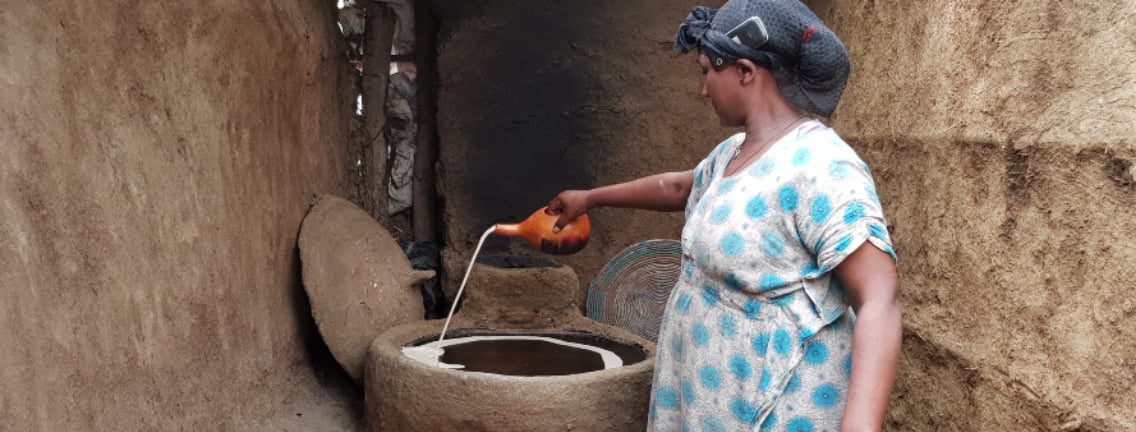How one company is making a difference with clean cooking in Ethiopia
In Ethiopia, many rural communities do not have access to clean, sustainable energy. Cooking inside on an open fire causes health issues and unsafe situations. It also hinders the national energy transition.

Grean World aims to provide 120,000 modern, clean cookstoves in rural Ethiopia with the support of SDG 7 Results. The company is well on its way to reaching this goal, says director Sileshi Alemayahu.
What activities and products does Grean World develop?
"Since 2016, we have made cleaner energy alternatives affordable and available to rural communities. We market solar products, ethanol as fuel, and we manufacture and market clean cookstoves. For example, mirt and ethanol stoves.
We try to reach rural communities through village-level entrepreneurs. We transport the products needed to village-level warehouses. There, local entrepreneurs sell them door-to-door at a capped price."
How does a mirt stove work?
"A mirt stove is made of mortar, a mixture of river sand and cement. It has an average life span of 5 years. The mirt stove is designed to cook injera, Ethiopia's national dish which resembles a large pancake. Cooking injeras accounts for more than 50% of the biomass energy use in Ethiopia. Tests show that the mirt stove reduces fuel use by 52%. It also reduces the carbon monoxide concentration in the kitchen by about 90% compared to three-stone stoves. So, the benefits of the mirt stoves are that they:
- reduce health risks due to less indoor air pollution,
- save time, as the stove requires 52% less fuel to work,
- reduce the risks of collecting wood from the forest,
- keep kitchens cleaner (and the cooks too!), and
- provide better food quality and improve the overall safety in the kitchen."
How does the marketing model work?
"We involve the women in rural villages to help solve the market infrastructure problem. We train them, our entrepreneurs, to use our products and services. They install the stoves in their kitchens to experience the benefits. Then, we train them in technical and marketing skills. Lastly, we inform them about the commission model. Then, they go door to door in their villages to sell the stoves. They use their local language, social structure and norms to approach their peers. As village members, they often know the decision-maker in the household. This means that they can promote the stove like no other."
Why is this business model important for Ethiopia?
"In the remote areas of Ethiopia, more than 14 million households still rely on three-stone stoves for cooking. This is 81% of Ethiopians. Creating market infrastructures in these areas is very expensive. Even though cooking is important, using these stoves is risky. Families are disproportionately suffering from toxic smoke from the three-stone stoves. And what makes matters worse is that the food is not very nutritious. Poor cooking and dirty kitchens increase the risk of bacterial contamination. For access to healthy cooking, we offer mirt stoves as a cleaner cooking option."
Why are most of the local entrepreneurs women?
"119 of our 140 village entrepreneurs are women. The mothers in the community prepare the meals and meet the household's energy needs. To feed their average family of 5, mothers spend most of their time in their kitchens. As a result, mothers are the main victims of energy poverty; they are the actual users of the stoves. We believe that our stoves solve their main problems." Grean World hopes to offer a solution by involving the women as entrepreneurs."
How does SDG 7 Results contribute to the company?
"We cannot carry out our plan for the energy transition, at least not in the next 10 years, without SDG 7 Results. We have limited resources due to high market risks and uncertainties. Specifically, we lack existing supply chains, logistics infrastructure, distributors and sometimes product awareness. Also, potential customers in rural households often have irregular incomes. This is often due to droughts, which result in farmers getting lower yields on their crops. This leads to a drop in income, making it harder to invest in more modern energy solutions.
Fortunately, SDG 7 Results offered us an opportunity to reach our goal. Between May 2020 and December 2021, we sold 81,134 mirt stoves in rural Ethiopia. This is 68% of our target of 120,000, so it is really impactful. With the result-based finance method of SDG 7 Results, we will certainly reach our goal within the 2 years we have left."
What are Grean World's future ambitions?
"We want to be a responsible leader in clean energy solutions by operating effectively in Ethiopia and the global renewable energy market. We want to lead the energy transition of rural and remote communities. With our business model, we support our entrepreneurs and customers on their way to a more sustainable future. Ethiopia could even use our model of employing local entrepreneurs for other policies such as health education, environmental protection and child education."
Would you like to know more about clean cooking?
To learn more about renewable energy, visit our theme page on renewable energy. Or find out about clean cooking on our What is clean cooking? page.